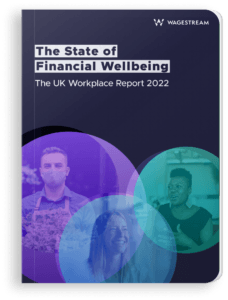D&I and Wellbeing
Blog: Talk About Money at Work – and 3 Other Steps Towards Financial Wellbeing
CRF partner Wagestream shares their key insights in their report on financial wellbeing in 2022
Financial wellbeing has never been a more urgent concern for employees, with inflation, the cost of living and wealth inequality all exacerbated by recent geopolitical events. However, employers are well-placed to support people with money worries by normalising discussions about money at work.
The problem is, when people do start to talk about money, it quickly becomes apparent that there are many misconceptions about financial wellbeing: for example, around saving, which can be one of the most powerful tools to support people with debt. People with debts often don’t bother saving – but it’s not always true that having debts means you shouldn’t save. It’s also not true that it’s never a good idea to dip into savings to cover outgoings – a study from NEST shows that even with withdrawals, savings tend to grow over time.
Plus, many people struggle to save because they can’t visualise a general desire for savings as a tangible outcome. It’s the personal, specific motivation – ‘I want to pay off that credit card’ or ‘let’s go on holiday next summer’ – that makes a difference.
So, what can employers do to combat misconceptions like these and help their employees have better conversations about money at work?
- Be clear on roles and responsibilities
Some of the people Wagestream interviewed for their 2022 report said that they felt it was fruitless to talk to their employer about money because there was nothing they could do to help. If employees aren’t clear on the benefits of a conversation, they are less likely to have one.
On the flipside, those likely to have money-related conversations with employees – often the line manager – should be trained to understand what their role is and where their responsibilities end. For example, they can’t ‘solve’ worry – but they can signpost to resources or additional support.
- Use money champions
Your organisation may already use Mental Health Allies or Mental Health First Aiders – money champions are the financial version of this concept. The role of Mental Health Allies is not to advise or fix, but can be a useful first step for someone to talk about their concerns and be signposted to specialist support if needed.
People are often more comfortable talking to a third party, like a financial coach or mental health specialist, than anyone else in the workplace. This may be driven by a lack of a financial relationship or any precedent for discussing money matters, whereas with a financial coach the relationship is predicated on talking about money. By having dedicated money champions in the workplace that can listen and signpost, organisations help create clear pathways for talking about money at work.
- Never let an opportunity go to waste
Furlough and Covid-19 made everyone think about money, and the 2022 cost-of-living crisis is making every stakeholder across society, from individuals and the private sector to government and charities, think in varying ways about money. These are prime opportunities for engagement and awareness campaigns: as an employer, nothing says you’re more open to having a conversation than starting one. Alongside money champions, you can publicise other resources like Talk Money Week from the Money and Pensions Service.
Read more from our partner Wagestream and their 2022 report.
UPCOMING CRF CONFERENCE:
Trading in the New
Business Landscape
Featuring Prof. Patrick Reinmoeller,
IMD Business School,
delivering Taking Strategic Action


